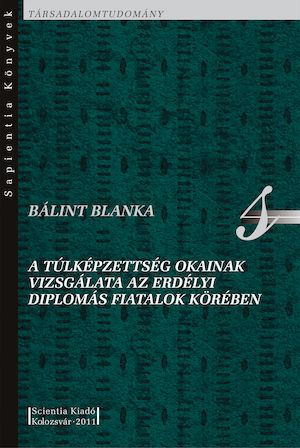A túlképzettség okainak vizsgálata az erdélyi diplomás fiatalok körében
An Analysis of the Causes of Over-Qualification among Young Graduates in Transylvania
Author(s): Blanka Bálint
Subject(s): Higher Education
Published by: Scientia Kiadó
Keywords: the social-economical structure of Romania; overqualification; job matching; Romanian graduates;
Summary/Abstract: The political transformation after 1989 resulted in important changes in the social-economical structure of Romania. One of the major changes was the massive job loss, the drastic decline of the ratio of employed population together with a high unemployment. Parallel with those a rapid growth has started in attendance to graduate studies. The expansion of higher education hasn’t stopped since. In these conditions it is an important research area analysing the possibilities of employment for the graduate population. One of the important aspects of the problem is the so-called job matching, meaning the relationship between qualification and job description where the match depends on the qualification. One type of mismatch is the so-called overeducation when the employee has a higher degree than necessary for that specific job. In this thesis, I examine the question of overeducation among the graduate young adults in Transylvania, Romania. I use the rational choice theory as a starting point to analyse the mismatch between the qualification and job requirement. Using this paradigm is a new approach in explaining the causes of overeducation, and as a theoretical frame gives an opportunity to handle in aggregation all of the most important economical and sociological models and theories developed to explain the problem of overeducation. In this thesis I’m looking to answer the some questions like: to what degree can overeducation be explained by the differences in social capital existing among the graduate young adults. Does overeducation depend on the costs of job search? What role has the differing skill level of the graduate young adults on overeducation? Does differential overqualification exist? Is overeducation the same among the different specializations? In my thesis, I will examine if the phenomenon of overeducation is a temporary phenomenon or a persisting one in the lives of graduate young adults? Examining overeducation in accordance with the available empirical data brings up the necessity of considering alternative hypotheses in the cases of the graduate young adults in a post – socialist Eastern European country. In the case of the Transylvanian graduate young adults overeducation seems to be a risk aversion attitude and offers an alternative to unemployment. This assumption could give an alternative path for the research of overeducation among Romanian graduates.
Series: Sapientia Könyvek
- Print-ISBN-13: 978-973-1970-52-3
- Page Count: 200
- Publication Year: 2011
- Language: Hungarian
- eBook-PDF
- Table of Content
- Introduction
- Sample-PDF

